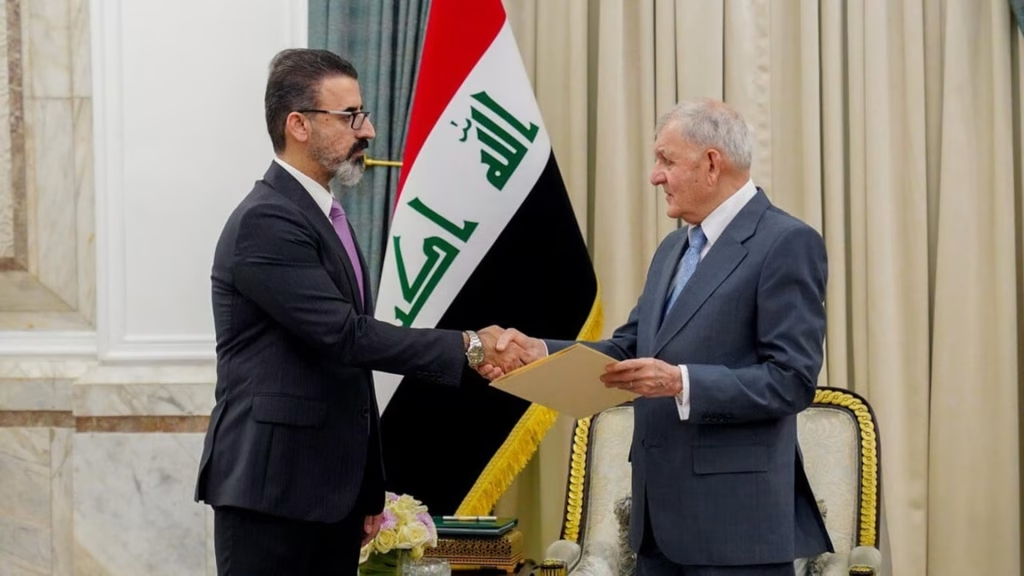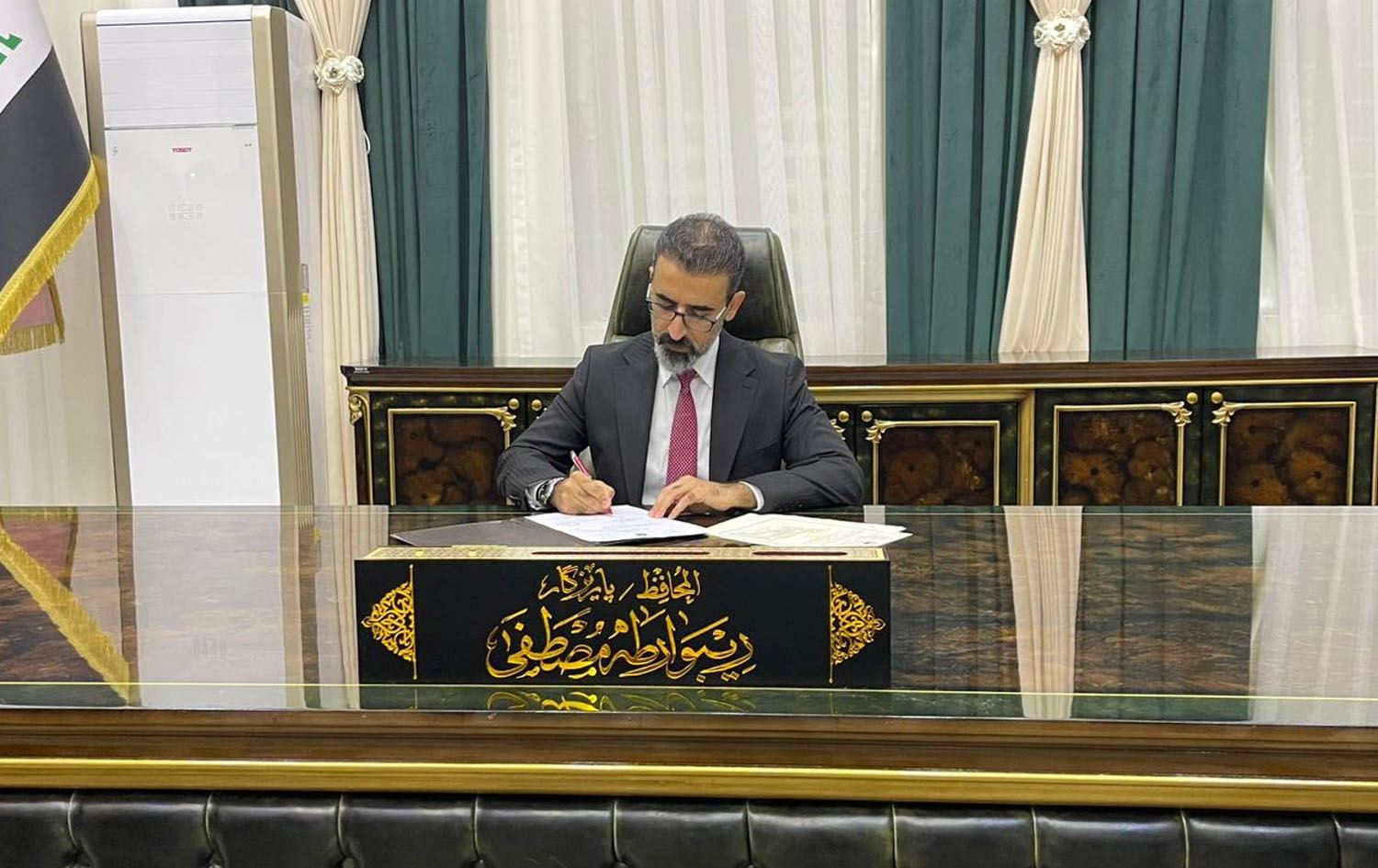Rebwar Taha, a Kurdish politician, was sworn in as Kirkuk’s new governor, pledging to make the province a model for peaceful coexistence. His election follows years of political strife, and Taha now calls on all factions to work together for the future of Kirkuk’s diverse population.
Rebwar Taha Sworn in as Governor of Kirkuk
Rebwar Taha officially became the governor of Kirkuk on Wednesday, assuming office with a clear mandate to foster peace and cooperation among the province’s diverse ethnic and political groups. Taha took the legal oath before Qassim Mohammed, president of the Kirkuk Appeal Court, a day after Iraqi President Abdul Latif Rashid issued the official presidential decree appointing him to the position.
In a press conference following his swearing-in, Taha emphasized his desire to unify the province’s various factions under a shared “Kirkuk identity.” He expressed optimism about building a future where all residents, regardless of ethnic or political background, work together for the province’s development. “We will all carry one identity which is the Kirkuk identity,” said Taha, adding that his administration would work “for Kirkuk and for the future of Kirkuk’s people.”
Despite opposition to his appointment, Taha urged critics to collaborate with him, stating that while political forces have the right to contest the results of the provincial elections, it is in Kirkuk’s best interest for everyone to unite and contribute to its progress.
Election of Key Leadership Roles in Kirkuk
Taha’s appointment came after a tense political period in Kirkuk, which has seen significant power struggles since the ousting of Kurdish Peshmerga forces in October 2017. Rakan al-Jabouri, who had served as acting governor since then, was retired from his post after reaching Iraq’s legal retirement age of 60, one of Taha’s first administrative actions as governor.

Iraqi President Abdul Latif Rashid issued the official presidential decree appointing him to the position. Image Credit: Iraqi President Media Office
Taha’s election was the result of a meeting held at the Rasheed Hotel in Baghdad on August 10, 2024, where the Kirkuk Provincial Council convened to determine the key leadership positions for the province. In addition to Taha’s appointment as governor, Mohammed Hafiz was chosen as the chairperson of the provincial council, and Ibrahim Tamim was selected as the first deputy governor. The second deputy governor position, however, was reserved for the Turkmen community, reflecting the ethnic diversity of Kirkuk’s population.
The Kurdistan Democratic Party (KDP) notably did not secure any official roles in this distribution of positions, which highlights the enduring political divisions in Kirkuk. Ethnic and sectarian loyalties have historically played a significant role in shaping the province’s leadership structure, making the upcoming period critical for Taha’s vision of peaceful coexistence.
A New Chapter for Kirkuk’s Future
Taha’s background and political experience make him well-equipped to handle the complex dynamics of Kirkuk. Born in 1982 in the province, Taha has spent much of his career advocating for the Kurdish people, while also working in security, counter-terrorism, and parliamentary leadership. His roles in the Iraqi Parliament, particularly on the Integrity Committee and Oil and Energy Committee, have earned him a reputation as a capable leader.
Taha was notably involved in the events following the Kurdish independence referendum in 2017, when Iraqi federal forces regained control of Kirkuk. His efforts during this period, including his role in safeguarding the Kurdish population, have made him a key political figure within the Patriotic Union of Kurdistan (PUK), the party that supported his candidacy for governor.
Taha’s vision for Kirkuk is one of unity, where ethnic divisions no longer define the province’s political landscape. “From today onwards, there is no such thing as nationalism, and we are all one,” Taha declared during his swearing-in ceremony. He stressed the importance of cooperation among Kirkuk’s diverse communities, insisting that his administration would not discriminate against anyone based on ethnicity or political affiliation.
Challenges Ahead: Opposition and Political Divisions
Despite Taha’s hopeful rhetoric, his appointment has not been universally accepted. Several political factions, including the Kurdistan Democratic Party (KDP), the Turkmen Front, and the Arab coalition led by former governor Rakan Juburi, have opposed the legality of the provincial council’s decision to elect Taha. These groups have expressed their intent to file a complaint with the Federal Court, challenging the validity of the meeting at which Taha was elected.
The opposition from these factions highlights the continued challenges Taha will face as governor. Since 2017, when the Kurds lost control of the governorship following the Kurdish independence referendum, the political landscape in Kirkuk has been deeply divided. Ethnic and sectarian loyalties remain strong, and Taha’s calls for unity may be difficult to realize without significant political concessions.
The results of the provincial council elections reflect these divisions. The PUK secured five seats, while the KDP won two. The Arab coalition won three seats, with other factions, including the Turkmen Front and Babylon faction, also claiming a share of the council’s leadership positions.
A Critical Moment for Kirkuk’s Future
Rebwar Taha’s election as governor of Kirkuk marks a potentially transformative moment for the province. His emphasis on unity and peaceful coexistence signals a desire to move beyond the ethnic and political divisions that have long plagued the region. However, the opposition from key political factions underscores the challenges he will face in achieving his goals.
Kirkuk’s history of political strife and its ethnically diverse population make the task of unifying the province a difficult one. Still, Taha’s experience, particularly in the Kurdish political sphere, and his determination to create a more inclusive future for all of Kirkuk’s residents, give him the tools to succeed. His success will depend on his ability to bring together Kirkuk’s various factions and build a political consensus that transcends ethnic and sectarian divides.
As governor, Taha has an opportunity to make Kirkuk a model for peaceful coexistence in a region often defined by conflict. How he navigates the political landscape in the coming months will determine whether Kirkuk can truly become the unified, forward-looking province he envisions.


